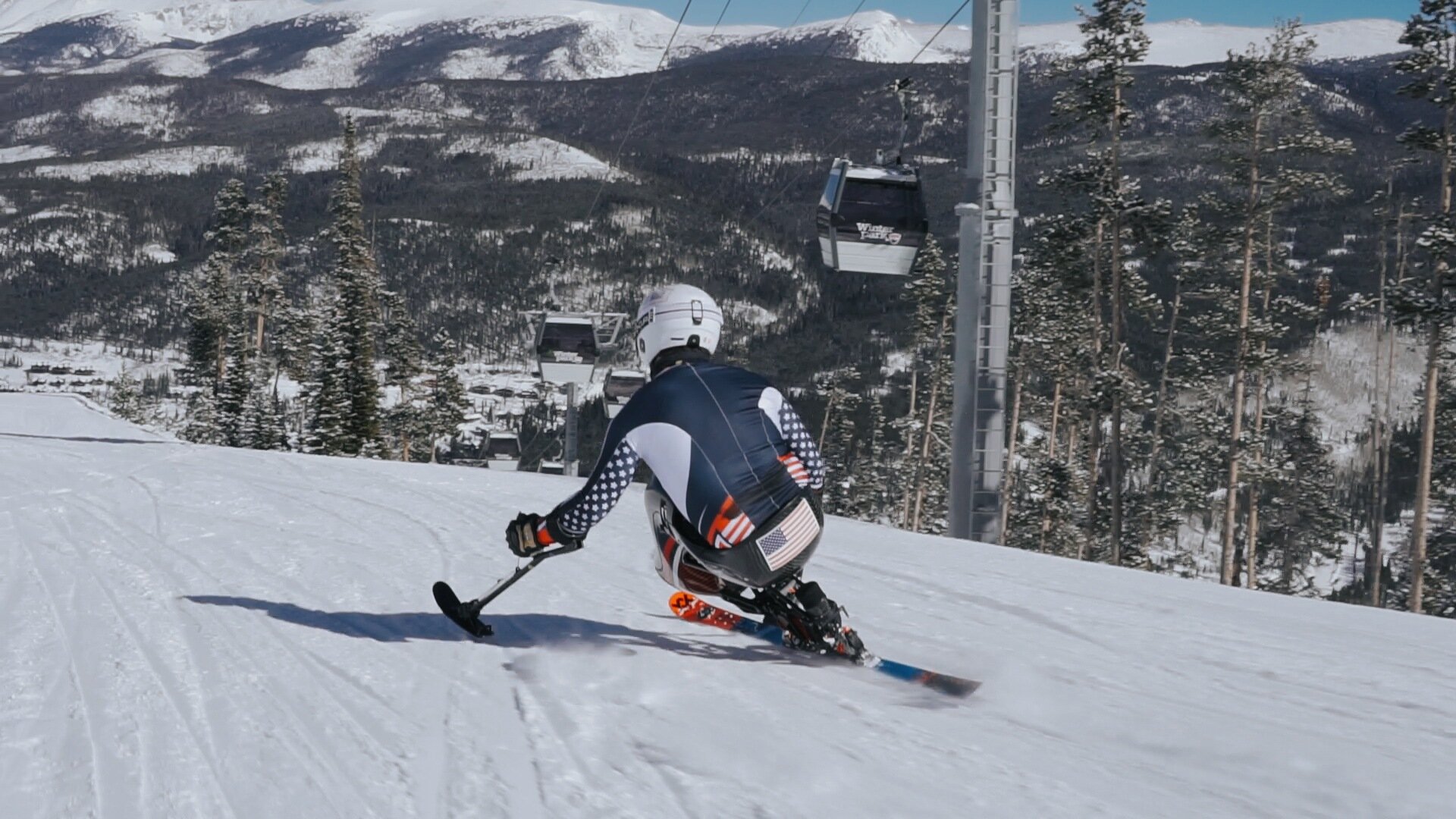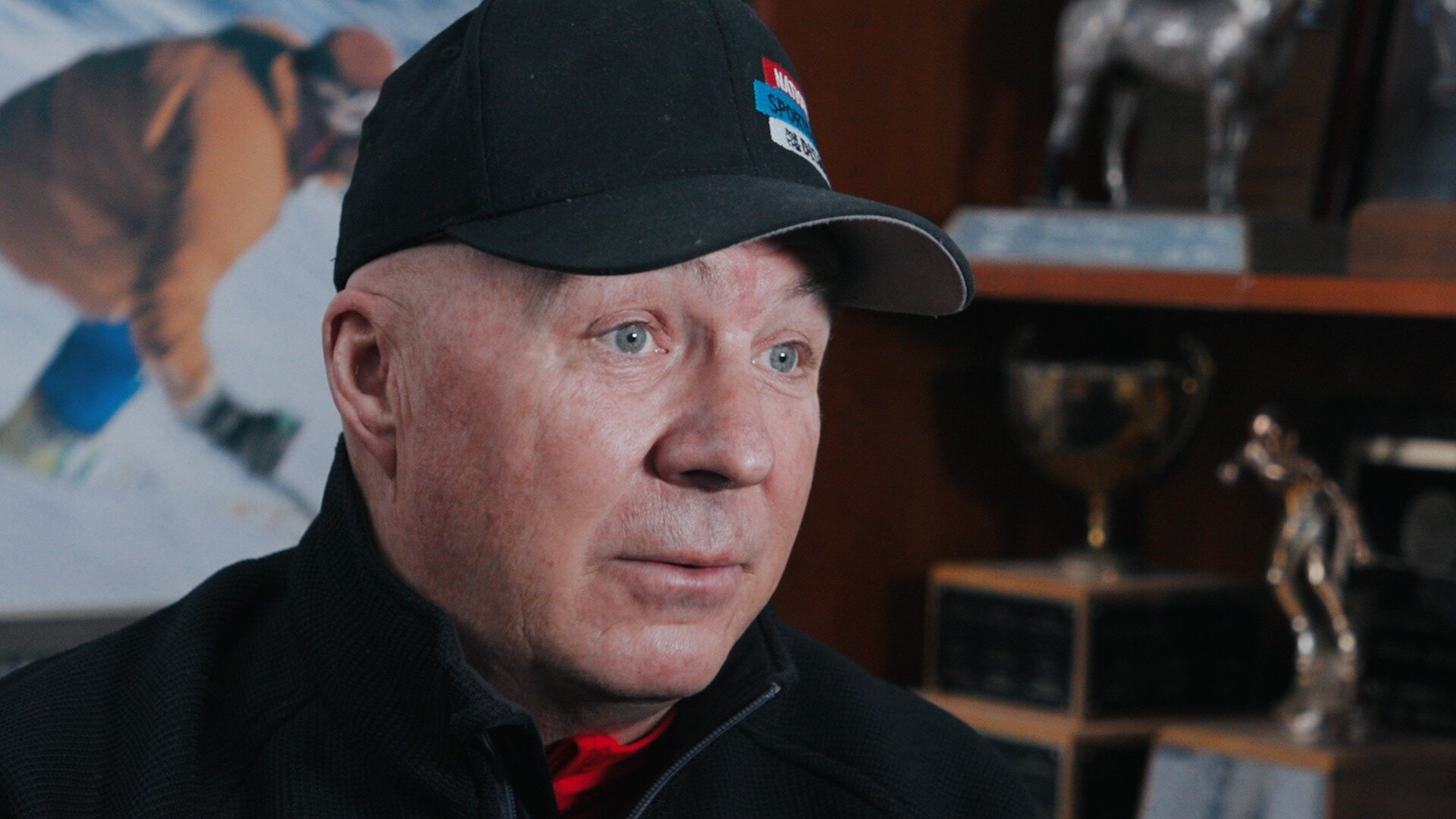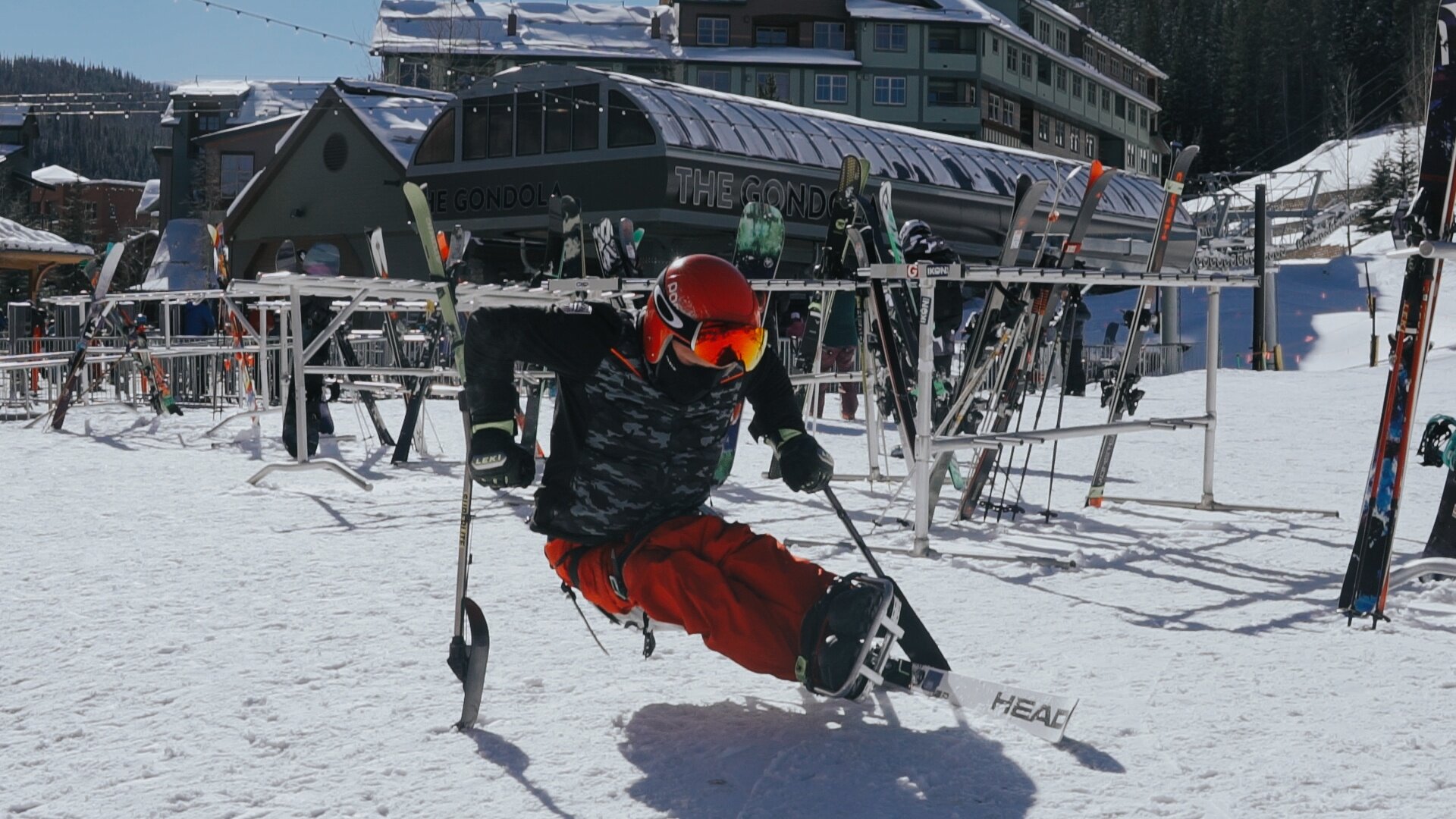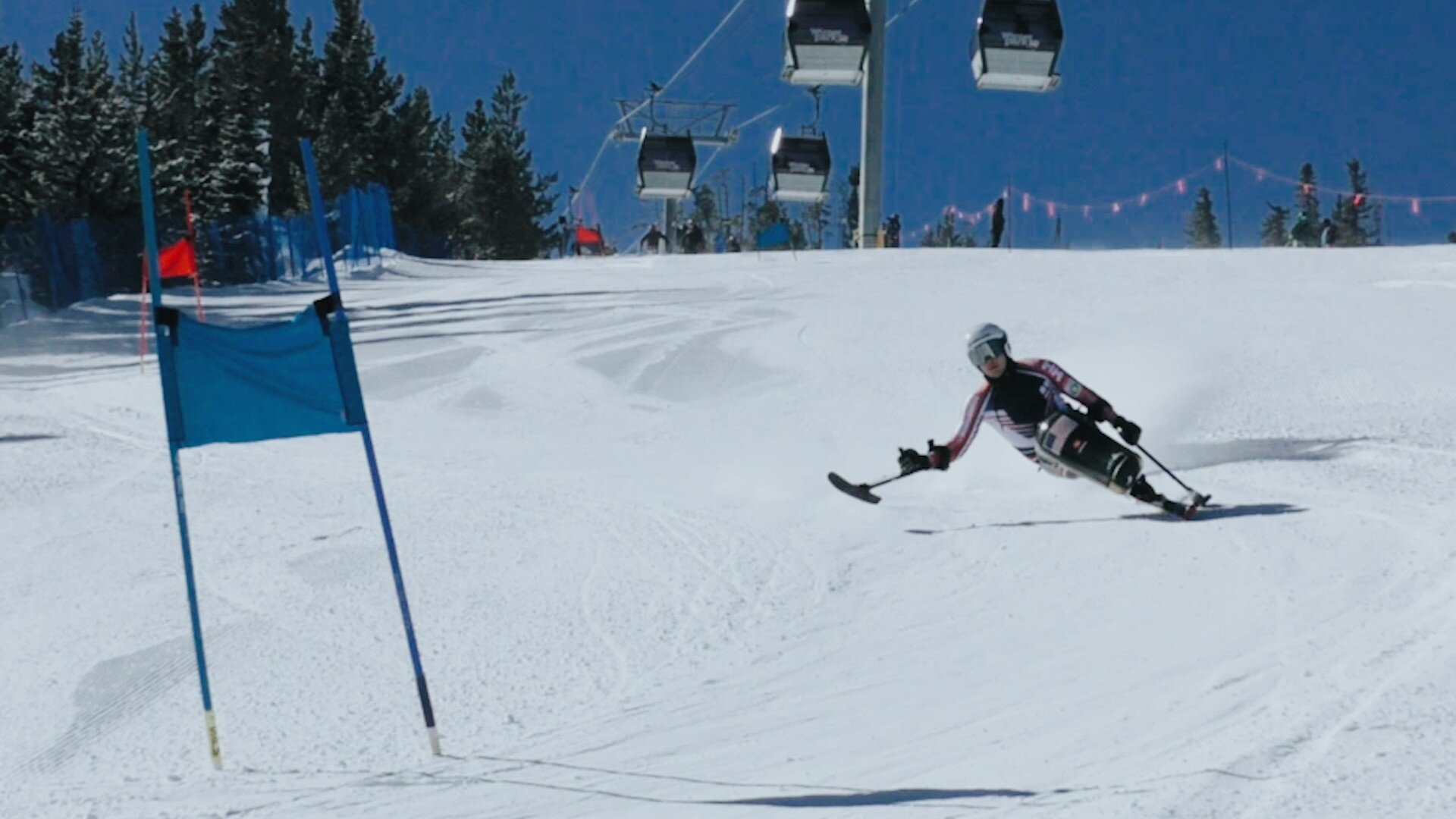'I’ve always been fearless:' Colorado Paralympians prepare for Beijing Games

WINTER PARK, Colo. — When two-time Paralympic medalist Andrew Kurka walked into the interview room, he was immediately concerned that the Rocky Mountain PBS journalists filming his story wouldn’t be able to keep up with him on the slopes as he trained for the 2022 Beijing Paralympics — and slowing down, even for the cameras, has never been an option.
“I’ve always been fearless,” Kurka said with a smirk.
Kurka began his athletic career as a wrestler in his home state of Alaska. He was good — six-time Alaska State Champion good. But when an ATV accident at age 13 left him partially paralyzed from the waist down, his wrestling career ended in an instant.
“I didn’t really know where to go from there,” said Kurka.
After becoming an ambassador for the Children’s Miracle Network and working with other children with disabilities and terminal illnesses, “I discovered that my own limits were the ones that I put on myself, that I could do anything out there. I just needed to do it differently, and I needed to accept that I was different,” remembered Kurka.
His physical therapist convinced him to try seated mono-skiing, an adaptive method of skiing designed for those with physical disabilities. He has been zooming down the mountain as fast as possible ever since.
“My feelings when I first got on the mountain was that of exuberant excitement. As soon as I got done with my first run, I was excited for my second,” Kurka said. “And my first run was, it was funny because I went straight down the mountain at the bottom and crashed and like tomahawked and everyone there was like, ‘oh my God, are you okay?’ I was like, yes, let's do that again.”
Within three years, Kurka went from crashing at the bottom of his first run to making the U.S. Paralympic race team. But fast tracking to success led to many injuries and failures, he said.
“There were a lot of injuries because of how quickly I progressed, how fearless I was and how successful I wanted to be right off the bat,” he said. “Once I made it to the U.S. team, I started crashing and breaking a lot of bones. I broke 22 bones throughout my career, give or take … and that was just because of my general fearless attitude when I was going out to compete.”
In the latter half of his career, he’s learned that going as fast as possible isn’t always the best path to victory, and that sometimes it can be beneficial to be more strategic in his races.
“For the first six years of my career, it was either a gold medal or a crash, and when I crashed I would always get injured,” he said. “[In the past five years] I've gotten more silvers and more bronze than I have before, but I've also finished more races and I have just as many gold medals. I’ve learned from my experience and my injuries, and it’s propelled me to become a better person in the process.”
It took Kurka 22 broken bones, including breaking his back twice and his femur once, to learn that lesson. Now, he’s ready to take that knowledge with him to the Paralympic winter games in Beijing.
On Feb. 16, Kurka was selected to compete for Team USA in the Beijing Paralympics.

In anticipation of the International Paralympic Committee (IPC) announcement of the final roster of athletes going to Beijing, Kurka had been spending four to six hours a day on the slopes, with the rest of his time dedicated to gym training and rest as needed.
Determining the particular athletes who qualify for the Paralympic Games is a complicated web of national and international organizations, qualification slots and competition scores at eligible events. In short, hopeful Paralympians need to prove that they are qualified to compete on a world stage just as able-bodied Olympians do. Once they’ve done that, all that’s left to do is train — and wait for the IPC to announce who will be competing.
Even though Kurka earned a gold and a silver medal in the 2018 PyeongChang Paralympics, he had to earn his spot like everyone else. Kurka will be competing in the LW12-1 sitting category, which describes the nature of his disability and places him in competition with other athletes at his level. In the same way the International Olympic Committee divides able-bodied athletes by gender or weight, the IPC divides athletes with physical impairments into categories based on their physical abilities.
The category an athlete fits into is determined by a team of experts referred to as classification personnel. Classification personnel can include medical classifiers like doctors, physicians and other medical experts, or technical classifiers like coaches or former athletes. This classification system is why you may see a Paralympian with all four limbs competing against someone who has lost a limb – the categories are based on physical ability, not on specifics relating to their impairments.
Kurka said he will always have skiing to thank for the immense positive impact on his life.
“Skiing definitely changed my life for the better, in every single way. If it wasn't for that, I don't know where I would've gone or what I would've done,” he said.
Kurka’s passion for skiing has affected those around him, including fellow Paralympic athletes and coaches
“It's a joy and a privilege to work with (Kurka), because he's always the first one on the hill and now he's always the last one off. He's just a great example to the other teammates that are around him because he sets the bar,” said Erik Petersen, Kurka’s current coach and the director of competition for the National Sports Center for the Disabled (NSCD).
NSCD has been working with athletes with disabilities since 1970, when the organization began teaching young amputees to ski in Winter Park. Since then, they’ve dedicated their organization to providing individuals with disabilities with opportunities for outdoor recreation, including training Paralympic athletes.
Petersen has been working with NSCD since 2005, and he says that working with Paralympic athletes is a challenging and rewarding career.

“In the able-bodied world, you can kind of say, ‘we want you to ski like Michaela Shiffrin,’ you know, or, ‘we want you to ski like Lindsey Vonn,’ but you can't really do that in this world because everybody's very different,” he said. “We have athletes that are visually impaired, that are missing limbs, or that ski sitting down in a mono-ski. All of their disabilities are very different … it’s challenging as a coach for sure.”
Regardless of the unique challenges his position brings, Petersen loves coaching, and says the athletes he works with aren’t really that different from able-bodied athletes.
“They want to go fast like anybody else, they want to be the best athletes that they can be,” he said. “It’s very rewarding to be able to take somebody from the inception of their career and see them grow into human beings that want to be the best that they can be, disabilities aside. They don't really care about that. They just want to go and be the best they can be.”
In Petersen’s time with NSCD, he’s trained over 300 athletes, many of whom have become Paralympic medalists. This year, he says that 10 to 15 of his athletes had a shot at making it to Beijing, including Kyle Taulman.
“While I was first learning on the mono-ski, I ran into the NSCD team training here at Winter Park. They encouraged me to go through a few gates, and I was probably only 10 years old. So I did it and made it through three gates before crashing and falling … My mom and my coach were mortified, but from then on I skied all the time, just going down the mountain way too fast,” Taulman said.
Taulman was paralyzed at the age of two due to a cancerous tumor that developed on his spinal cord. He began skiing when he was three. To start out, his parents placed him in a padded bucket attached to skis and guided him down the mountain with ropes. At the age of nine he graduated to a sitting mono-ski, and began racing with NSCD at the age of 14.

Although he attended the Pyeongchang Paralympics in 2018 as an ambassador, Beijing will be Taulman’s first time competing in the games.
“Technically I'm qualified for the games based on points and rankings in the U.S., but it'll really depend on how many athletes they decide to take, you never know which way it'll go,” he said before the teams were announced.
Although many athletes of his caliber dedicate seven days a week to training, Taulman is balancing skiing and schooling as he pursues a degree in engineering from CU Boulder. He’s taken this semester off to focus more on training, but he says that engineering still affects the way he skis.
“A lot of times I'm over-analytical and overthink it. A lot of times I'll cross the finish line and shake my head because I feel like I didn't ski as well as I could have. And actually that has, in some ways, hurt me,” he said. “I’ve had to change my mindset, and not be too hard on myself. I still want to have fun … because I love skiing. It's super fun. You get to throw yourself down a mountain at high speed and just, you know, that's cool.”
Even though balancing school and skiing is difficult, he loves encouraging young athletes to follow their dreams.
“It's about commitment and you know, time management really … Anything that you're going to put time into is going to be challenging, but there's a fun part in that when it starts to pay off. I've put a lot of time into my skiing. I've put a lot of time into everything I try to do,” he said.
His time, dedication and commitment paid off, earning him a ticket to Beijing with Kurka.
“I've always kind of had that dream of being able to go to the Paralympics and just represent my country and myself on that world stage and being so close to having that opportunity, I want it so badly,” Taulman said. “I just have to race my best and see what I can do to get there, but it would really mean the world to me.”

The 2022 Winter Paralympics will take place from March 4-13 in Beijing, China. The games are set to air on NBC, Peacock, USA Network, Olympic Channel, NBCOlympics.com and the NBC Sports app.
Corbett Stevenson is a journalism intern at Rocky Mountain PBS. You can reach her at corbettstevenson@rmpbs.org.
Alexis Kikoen is a multimedia journalist at Rocky Mountain PBS. You can reach her at alexiskikoen@rmpbs.org.
Clarissa Guy is a multimedia journalist at Rocky Mountain PBS. You can reach her at clarissaguy@rmpbs.org